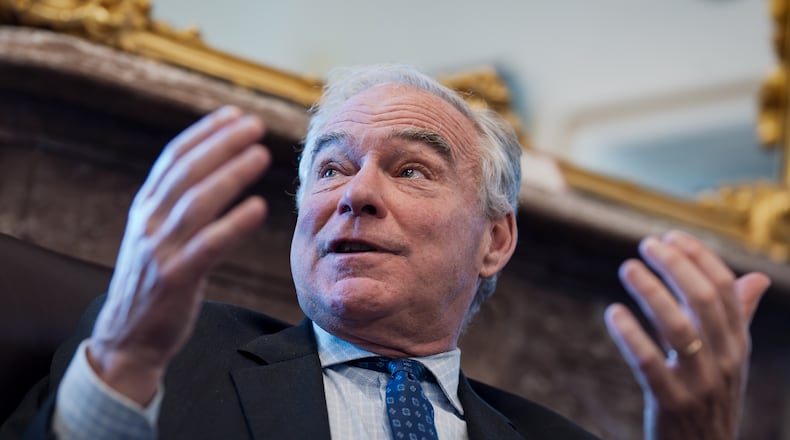Sen. Tim Kaine of Virginia, the Democrat pushing the resolutions, said that higher prices caused by tariffs would force Republicans to break with Trump. “It will become untenable for them to just close their eyes and say, ‘I’m signing up for whatever the president wants to do,’” Kaine told reporters.
The Senate passed a similar resolution applying to Brazilian tariffs on Tuesday, and it has already passed a resolution on Canadian imports in April. The same four Republicans — Sens. Sens. Lisa Murkowski of Alaska, Susan Collins of Maine, Mitch McConnell of Kentucky and Rand Paul of Kentucky — voted again with all Democrats to approve the resolution applying to Canada.
Kaine, joined by other Democrats and Paul, has forced the votes under a decades-old law that allows Congress to block a president’s emergency powers. However, House Republicans have passed new rules that allow leaders to prevent such resolutions from getting a vote in that chamber, and Trump could veto the legislation even if it did clear Congress.
Wednesday's vote happened as Trump was in Asia to advance trade talks with partners there. The president has also been jousting with Canadian officials amid a delicate negotiation to reduce tariffs between the two countries.
Sen. Mike Crapo, the Republican chair of the Senate Committee on Finance, acknowledged in a floor speech that many “may be nervous about what comes next” as Trump remakes global trade. But he urged Congress to stay out of the way.
“Let’s truly get a balanced, fair playing field in trade,” Crapo added.
Yet there is increasing tension between GOP senators and the president over how soybean farmers have suffered from the trade war with China, as well as his administration's plans to allow the purchase of more beef from Argentina.
Vice President JD Vance visited Republicans during a closed-door luncheon this week and also argued that they should steer clear of trade policy while the president negotiates deals. But Vance's efforts appeared to have little impact on those determined to vote against the tariffs.
“Retaliatory tariffs on American products have turned agricultural income upside down for many of Kentucky’s nearly 70,000 family farms,” said Kentucky Sen. Mitch McConnell, the former longtime Republican Senate leader, in a statement. “Bourbon has been caught in the crossfire from day one. And consumers are paying higher prices across the board as the true costs of trade barriers fall inevitably on them.”
Trump said earlier this week he wanted to impose another 10% tariff hike on imports of Canadian goods because of an anti-tariff television ad aired by the province of Ontario. The television ad used the words of former President Ronald Reagan to criticize U.S. tariffs.
Canadian Prime Minister Mark Carney has been trying to engage with Trump to ease the import taxes that have hit Canada hard. The U.S.-Canada economic relationship is one of the largest globally, totaling $909.1 billion in 2024, according to the Office of the U.S. Trade Representative. More than three-quarters of Canadian exports go to the U.S., and nearly $3.6 billion Canadian ($2.7 billion U.S.) worth of goods and services cross the border daily.
Canada has also tried to turn to Asian trading partners amid the trade war.
Democrats argued the trade war was impacting a range of industries, from farmers to shipbuilders. They also said it made little sense to engage in a trade war with a close military ally.
Trump has invoked a national emergency to impose the tariffs, saying that fentanyl and other illegal drugs are entering the country from Canada. So far this year, less than 1% of the total fentanyl seized by U.S. Customs and Border Protection, 66 pounds, was seized at the northern border.
Kaine argued in a floor speech that Trump's trade policy was actually hinging on his personal feelings. He claimed that Trump had “such thin skin that an ad on television quoting Ronald Reagan” had prompted an end to the negotiations.
He asked, “How about that as a rationale for trade policy?”
